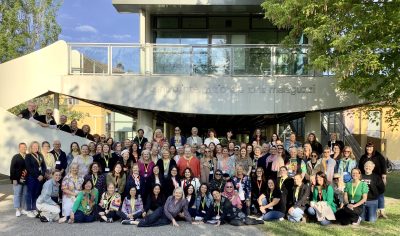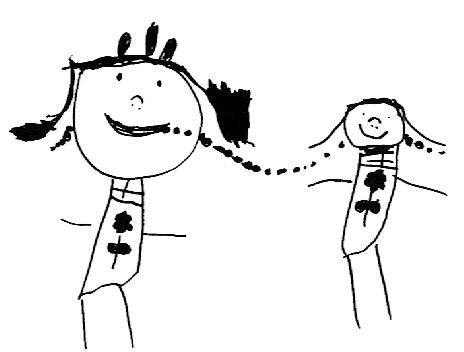
This year’s April Study Tour to Reggio Emilia consisted of one hundred delegates from around Australia supported by two study tour leaders, Ruth Weinstein, and Kirsty Liljegren. Participants ranged from the early childhood and primary sectors, along with delegates in leadership roles, consultancy, and tertiary education.
Optional side trips to Florence and Venice at the beginning of the visit were tremendous opportunities to immerse in the Italian culture, form new relationships, and share some exciting encounters.
Before the program’s official start, the group gathered on Sunday to connect and engage in deep, thought-provoking conversations. This encounter was a time to share their hopes and wonderings for the tour.
Many delegates had been waiting since 2020 to attend this study tour, so the room was a buzz with an immense sense of anticipation and excitement as each group summarised and shared the thinking of the eleven groups.
Following the meeting, delegates could go to the Loris Malaguzzi Centre and register for the Study Tour, allowing them to explore some of the displays and Ateliers in the centre.
A side trip to Museo Cervi (a museum dedicated to seven brothers killed by the fascists because of their involvement in the Resistance movement) was offered, with twenty-one delegates attending. It was a poignant opportunity to gain an insight into the historical and cultural background of the area, which connects strongly to the values that uphold the educational project.
On the first day, a representative of each of the largest Networks represented at the Study Tour, England, Australia, New Zealand, and South Africa, welcomed the large group of 420 from twenty-seven countries. Ruth and Kirsty offered words of wisdom based on their previous experiences in Reggio Emilia. Reggio Children mirrored this enthusiasm and deep emotion as this was the first International Study Tour since COVID.
We were propelled into five days of an enriching, enthralling, at times confronting, but profoundly moving pedagogical encounter. The President of Reggio Children, Cristian Fabbi, set the scene by declaring that “research goes on every day, every minute of the day” with a commitment to changing “the way we behave towards the planet.” Moira Nicolosi, pedagogista, shared that “theory is nurtured in a virtuous circularity between theory and practice. This is where we find research.”
The much-anticipated centre visits occurred over the first three days, where smaller groups were welcomed warmly by the whole team, the pedagogista, atelierista, teachers, and cooks. This dialogue was an opportunity to gain insight into the current pedagogical research and ask questions after encountering the centre.
Another highlight was the opportunity to participate in self-chosen ateliers, a central idea of the educational project. Delegates were creatively absorbed in vibrant and dynamic contexts such as the ateliers of light, visual metaphor, gears, Mosaic of marks, words, materials, sensitive forms, and so on. These deeply engaging hands-on ateliers gave an insight into the intentionality that informs the design of the various encounters for children.
On the last day, visiting the Remida, the creative recycling centre, was a fantastic opportunity to be immersed in the materials that often inspire the work in the centres.
At the final session, Ruth was invited to summarise the week and offer ideas for moving forward. She thanked Reggio Children for the gifts they had presented us. The gifts of optimism and joy, the gift of believing we can make a difference in the lives of children we learn alongside, and the gift of new friends and connections from around the world. She drew inspiration from the song ‘We Are One, and We are Many’ to bring us all together to share a dream and sing with one voice …to change the world of education one small step at a time …and in the words of Loris Malaguzzi and Reggio Children,
“Nothing without joy. ….and effort”
The final night was celebrated with a dinner filled with joy, laughter, singing, and dancing—an opportunity to embrace new friendships and look forward to continuing connections.
Insights from some participants:
Kate: I absolutely loved the session on Organisation- Organisation is about ethics- this has been the driver of my shift in practice since the last study tour in 2014. It’s a shared responsibility, and that was clearly visible in our centre visit yesterday. Love the documentation that supports this across the schools – very strategic program yesterday to steer our thinking.
Kitty: This journey also taught me that I don’t only have responsibility for children but also have a great responsibility for each other.
Henrietta: A key idea for me I noticed yesterday ….. was the way experiences and palettes were carefully curated for children to create in collaboration and not in isolation. Both in the videos from the auditorium and from the site visit, it was beautiful to see children producing something with and for the group and not for individual benefit. The ethical value behind it. The chance for authentic collaboration to be offered and welcomed by children and for that to be their ‘norm.’
Baz: It has been an amazing journey, and nothing has been without joy. …. I’ve learned to now sit in the uncomfortable and get comfortable with exploring new and amazing possibilities, so for that, I say thank you.
Chantelle: As I reflect on my recent visit to Reggio Emilia as an Australian study tour participant, I am filled with a deep sense of gratitude for the innovative and inspiring educational project that has its roots embedded in this wonderful city.
From the moment I arrived, I felt a sense of connection to the people and culture of this remarkable place. It all began to make sense after many years of reading and practice.
But what really touched me was the way that the people of Reggio Emilia are committed to creating a better world for everyone. Their dedication to educational equality and social justice is truly incredible.
The Educational Project of Reggio Emilia is not just a philosophy of education but a way of life. It has the power to transform not only the way we educate our children but the way we live our lives and interact with the world around us to advocate for human rights, liberty, and equality. To think deeply about our educational and political responsibility. I leave with a full and overwhelmed heart. I have A LOT to think about moving forward.

